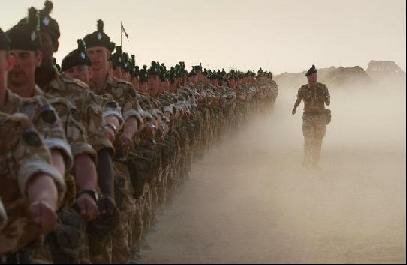The British Military Has “Succeeded In The South Of Iraq”
WAPO:
LONDON, Oct. 10 — The British military has “succeeded in the south of Iraq,” but the public has not fully understood that, because top government and military figures created “false expectations” of what troops could accomplish there, the head of the British military said Wednesday.
“We perhaps allowed people to get the sense that our presence there was going to restore Iraq to its former glory,” Air Chief Marshal Jock Stirrup said in an interview.
Without blaming anyone specifically for the “misunderstanding,” Stirrup said British leaders created the impression that troops were going to leave Iraq “with a burgeoning economy, with prosperity spreading throughout the country, with everyone living quietly and tending their gardens and enjoying the cool of the evening after a good day’s work.”
Stirrup, who took over last year as chief of the defense staff, Britain’s top military officer, said the British military’s main strategic objective has always been limited to establishing security in the Basra region and returning it to Iraqi control.
“We are now at the state, in my judgment, where we have essentially reached that position — not quite, because there’s still a bit more to do, but we’re very close to it,” said Stirrup, a former fighter pilot. “Despite some daunting odds, the British military has succeeded in the south of Iraq.”
He demurred when asked whether government officials — chiefly President Bush and then-Prime Minister Tony Blair — had sold the public a much broader strategic goal for military action in Iraq: establishment of a democratic beachhead in the Middle East. “As I wasn’t the salesman, I can’t comment,” he said. But he added, “It’s very important that we don’t confuse visions with strategic objectives.
“We can have a vision, for example, that the lion will lie down with the lamb and everyone will beat their swords into plowshares,” he said. “And that’s a noble aspiration and vision to have. But I have to tell you, it doesn’t make a good strategic objective.”
Speaking in his office near the River Thames in central London, Stirrup said officials’ failure to clearly articulate military goals was partly to blame for the war’s deep unpopularity among the British public.
“I’m afraid that we have allowed, all too often, misunderstandings to arise,” he said, “for people to imagine that our mission there is to create some sort of urban idyll, which was never our mission and was never achievable.”
Last month, the British military withdrew the final 500 troops from its last base in downtown Basra and redeployed them to a base at the city’s airport. Prime Minister Gordon Brown said this week that Britain’s force in Iraq, which totaled 5,500 troops at the beginning of September, would be reduced to 4,500 by year’s end and 2,500 by spring.
British officials have told reporters here that it was possible all British troops could leave Iraq by the end of 2008. Stirrup said he would not speculate about when the last might come home, but he strongly disputed reports that Bush administration officials oppose the withdrawal by their main coalition partner.
“This is not a case of the U.K. saying we no longer want to be involved on the ground,” Stirrup said. “This is saying the job which we undertook on the ground in the southeast is making good progress and at some stage in the future it’ll be done.”
Stirrup said Britain would still provide air and naval support and Special Forces to the coalition, as well as participate in coalition command decisions in Baghdad.
Stirrup said he consults frequently with his U.S. counterparts, who support the British redeployment and are trying to learn from it. “They have said that they see what we are doing in the south as a sort of interesting lab test, if you like, for what might have to be done on a wider, industrial scale across Iraq,” he said.
Stirrup said the United States and Britain have different “long-term aspirations” for their relations with Iraq.
“My understanding is that there is an aspiration for a longer-term security relationship between the United States and Iraq which involves U.S. military presence on the ground in Iraq,” he said. “That’s fine, if that’s what the U.S. wants to do there. But that’s not the U.K.’s long-term intent.”
Critics in Britain and the United States have suggested that British troops in Basra withdrew because of repeated attacks, mainly by Shiite militias.
“People suggested we were getting out because we were bombed out, we were running with our tails between our legs. This is all complete nonsense,” Stirrup said. “This is all part of a strategic approach that was decided on the better part of a year and a half ago.”
Stirrup said he has “always been somewhat baffled that people are unwilling to concede that we are having some success.” The problem, he said, “is that too many people have assumed that you were only going to transition when all is sweetness and light. That’s completely wrong. That sweetness and light can only be achieved by Iraqis.”




 Be respectful of others and their opinions. Inflammatory remarks and inane leftist drivel will be deleted. It ain’t about free speech, remember you’re in a private domain. My website, my prerogative.
Be respectful of others and their opinions. Inflammatory remarks and inane leftist drivel will be deleted. It ain’t about free speech, remember you’re in a private domain. My website, my prerogative. If you can't handle using your real email address, don't bother posting a comment.
If you can't handle using your real email address, don't bother posting a comment.
Aagghh. What horse puckey! Leaving the south in the control of JAM and BADR is not significantly distinguishable from defeat. It will all have to be redone, right from the top down.
October 11th, 2007 at 11:16 pm